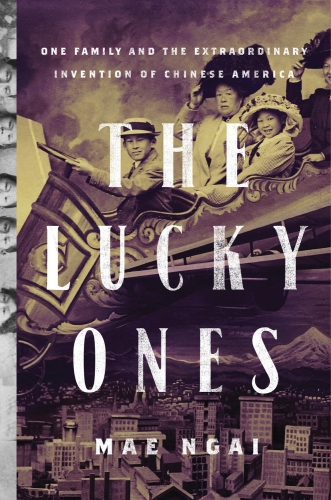28 Oct / The Lucky Ones: One Family and the Extraordinary Invention of Chinese America by Mae Ngai

 When the local San Francisco public school denied Mamie Tape admission solely based on her Chinese heritage, her parents sued the city’s Board of Education in what became the landmark 1885 case, Tape vs. Hurley. Mamie was seven years old, the American-born child of middle-class Chinese Americans … and her parents fought the unjust legal system 125 years ago!
When the local San Francisco public school denied Mamie Tape admission solely based on her Chinese heritage, her parents sued the city’s Board of Education in what became the landmark 1885 case, Tape vs. Hurley. Mamie was seven years old, the American-born child of middle-class Chinese Americans … and her parents fought the unjust legal system 125 years ago!
Joseph Tape was a young Chinese immigrant who started his American life as a houseboy and eventually became a successful businessman. He met and married Mary McGladery, a fellow Chinese immigrant saved from indentured servitude by Christian missionaries, and raised by the Ladies’ Society’s Miss McGladery from whom Mary took her American surname: “Under Miss McGladery’s tutelage, young Mary became a genteel, westernized girl in a Chinese body, her former Chinese self repressed into the unconscious.” Joseph and Mary courted in English and were culturally bound by their American upbringing; they became two of America’s first-ever Chinese Americans.
Joseph and Mary had four children, the oldest being Mamie, for whom the Tapes went all the way to the Supreme Court to demand an equitable education. In spite of a ruling in their favor, Mamie never got to attend the white school in San Francisco, and eventually the family moved across the East Bay to Berkeley.
Of Mamie’s three younger siblings, brother Frank – the pampered only son – had a notorious career as a government translator (in spite of his rudimentary Chinese) and informer (who was not above ignoring the law); his scandalous love life also earned him local infamy. He eventually redeemed himself by marrying a respectable, much younger Chinese American woman, Ruby, who tired of his philandering and eventually enlisted with the Women’s Army Corps during World War II! After serving in Japan, Ruby got herself transferred to China where she tracked down the sister left behind during a family trip to China decades before, and brought her back to the U.S. although no mention is made of the sister’s eight children …
The Tape family – three generations are included here – had no shortage of memorable characters. Alas, their family saga suffers from far too many distractions of ‘seems to be,’ ‘could have been,’ and ‘probably’s that jar and interrupt the book’s flow. Granted, history is never 100% certain, and Mae Ngai, a Columbia University history professor and award-winning author of Impossible Subjects: Illegal Aliens and the Making of Modern America, includes a lengthy “Author’s Note” about her 10-year research process with an emphatic “I made up nothing.” Disclaimer aside, too much hedging and guessing ultimately detract from her historical authority.
No one will doubt that the Tape family story is a remarkable testament to early pioneering Chinese American history … but their exceptional tales should have been better told.
Readers: Adult
Published: 2010
